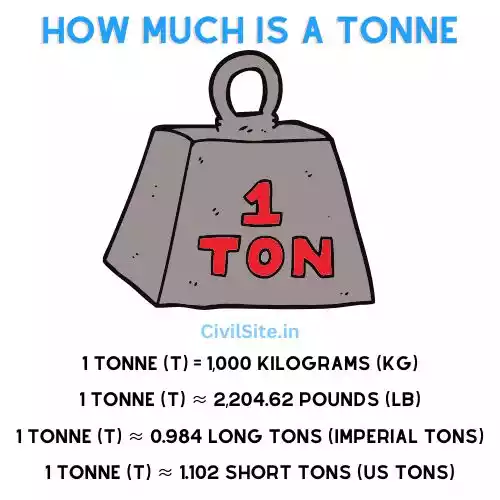Table of Contents
Knowing how much is a tonne is important for day to day working. Understanding different units is a fundamental skill that enables effective communication and accurate interpretation. Among these units, the “tonne” stands as a significant metric weight measurement used worldwide.
How Much is a Tonne
Tonne to Pounds Converter
Converted Value:
In this comprehensive post, we’ll delve into the world of weights and explore the concept of a tonne, providing you with a clear understanding of its magnitude and significance in various contexts.

Understanding the Tonne: A Metric Weight Unit
Before we unravel the details, let’s establish a solid foundation by understanding what a tonne represents:
- Tonne (t): The tonne is a metric unit of weight that is equivalent to 1,000 kilograms or approximately 2,204.62 pounds. It’s denoted by the symbol “t” and is used globally as a standard unit of measurement.
The tonne is employed in a wide range of applications, from commerce and industry to science and engineering. It’s particularly popular in countries that use the metric system, including most of Europe and many other parts of the world.
Putting the Magnitude into Perspective
To comprehend the magnitude of a tonne, let’s consider a few real-world examples:
- A Car: The weight of an average car is typically around 1 to 1.5 tonnes. This provides a tangible sense of the tonne’s significance in terms of everyday objects.
- Freight and Cargo: In logistics and transportation, goods are often measured in tonnes. Shipping containers, for instance, can carry several tonnes of cargo across oceans and continents.
- Construction Materials: The weight of construction materials such as concrete, steel, and bricks is frequently measured in tonnes. This is crucial for ensuring structural integrity in buildings and infrastructure projects.
Recommended for you:
Converting the Tonne to Other Units
While the tonne is a standard metric unit, it can be useful to understand its equivalent in other weight measurements:
- 1 tonne (t) = 1,000 kilograms (kg)
- 1 tonne (t) ≈ 2,204.62 pounds (lb)
- 1 tonne (t) ≈ 0.984 long tons (imperial tons)
- 1 tonne (t) ≈ 1.102 short tons (US tons)
Here’s a comparison table for metric tonnes (t) and their equivalents in various other weight units:
| Unit | Equivalent Weight in Metric Tonnes (t) | Equivalent Weight in Kilograms (kg) | Equivalent Weight in Pounds (lb) | Equivalent Weight in Short Tons (ton) | Equivalent Weight in Long Tons (ton) |
|---|---|---|---|---|---|
| 1 Metric Tonne (t) | 1 t | 1000 kg | 2204.62 lb | 1.10231 ton | 0.984207 ton |
| 1 Kilogram (kg) | 0.001 t | 1 kg | 2.20462 lb | 0.00110231 ton | 0.000984207 ton |
| 1 Pound (lb) | 0.000453592 t | 0.453592 kg | 1 lb | 0.0005 ton | 0.000446429 ton |
| 1 Short Ton (ton) | 0.907185 t | 907.185 kg | 2000 lb | 1 ton | 0.892857 ton |
| 1 Long Ton (ton) | 1.01605 t | 1016.05 kg | 2240 lb | 1.12 ton | 1 ton |
Practical Applications and Significance
The tonne holds practical importance across various industries and sectors:
- Commerce: In trade and commerce, commodities are often bought and sold in tonnes. This standardization facilitates fair pricing and accurate transactions.
- Manufacturing: Industries that involve production and assembly often deal with raw materials and components measured in tonnes. This ensures efficient manufacturing processes.
- Agriculture: The weight of crops, livestock feed, and agricultural products is measured in tonnes, aiding in yield estimation and resource planning.
Conclusion: Grasping the Weight of a Tonne
As we conclude our exploration of the tonne as a unit of weight, we hope to have provided you with a deeper understanding of its significance. From vehicles to construction materials, the tonne plays a pivotal role in various sectors, facilitating precise measurement and informed decision-making.
Remember, every weight has its own impact and relevance. Embrace the concept of the tonne, and you’ll find yourself equipped to navigate weight-related discussions and scenarios with confidence.